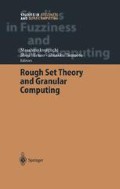Abstract
Standard rough set theory is developed based on the notion of indiscernibility of elements of a universe. Typically, indiscernibility is modeled by an equivalence relation, which may not provide a realistic description of real-world relationships between elements. In this paper, the notion of weak fuzzy similarity relations, a generalization of fuzzy similarity relations, is used to represent indiscernibility of elements. A specific type of weak fuzzy similarity relations, called conditional probability relations, is discussed. Generalized rough set approximations are defined by using a-coverings of the universe induced by a weak fuzzy similarity relation. Three types of rough membership functions are defined and their properties are examined.
Access this chapter
Tax calculation will be finalised at checkout
Purchases are for personal use only
Preview
Unable to display preview. Download preview PDF.
References
Intan, R. and Mukaidono, M. (2000) Conditional probability relations in fuzzy relational database, Proceedings of RSCTC’00, pp. 213–222.
Intan, R., Mukaidono, M. (2000) Fuzzy functional dependency and its application to approximate querying’, Proceedings of IDEAS’00, pp.47–54.
Intan, R., Mukaidono, M., Yao, Y.Y., ‘Generalization of Rough Sets with a-coverings of the Universe Induced by Conditional Probability Relations’, Proceedings of International Workshop on Rough Sets and Granular Computing, (2001), pp.173–176.
Klir, G.J. and Yuan, B. (1995) Fuzzy Sets and Fuzzy Logic: Theory and Applications, Prentice Hall, New Jersey.
Komorowski, J., Pawlak, Z., Polkowski, L., Skowron, A. (1999) ‘Rough Sets: A Tutorial’.
Pawlak, Z. (1982) Rough sets, International Journal Computation Information Science, 11, pp. 341–356.
Pawlak, Z., Skowron, A. (Wiley, New York, 1994) Rough membership functions’, Fuzzy Logic for the Management of Uncertainty (L.A. Zadeh and J. Kacprzyk, Eds.), pp.251–271.
Polkowski, L. and Skowron, A. (Eds.) (1998) Rough Sets in Knowledge Discovery, I, II, Physica-Verlag, Heidelberg.
Yao, Y.Y. (1996) Two views of the theory of rough sets in finite universe, International Journal of Approximate Reasoning15, pp.291–317.
Yao, Y.Y. (1997) Combination of rough and fuzzy sets based on a-level sets, in: Rough Sets and Data Mining: Analysis for Imprecise Data, Lin, T.Y. and Cercone, N. (Eds.), Kluwer Academic Publishers, Boston, pp. 301–321.
Yao, Y.Y. (1998) A comparative study of fuzzy sets and rough sets, International Journal of Information Science, 109, pp. 227–242.
Yao, Y.Y. (1998) Generalized rough set models, in: Rough Sets in Knowledge Discovery, Polkowski, L. and Skowron, A. (Eds.), Physica-Verlag, Heidelberg, pp. 286–318.
Yao, Y.Y. and Zhang, J.P. (2000) Interpreting fuzzy membership functions in the theory of rough sets, Proceedings of RSCTC’00, pp. 50–57.
Author information
Authors and Affiliations
Editor information
Editors and Affiliations
Rights and permissions
Copyright information
© 2003 Springer-Verlag Berlin Heidelberg
About this chapter
Cite this chapter
Intan, R., Yao, Y.Y., Mukaidono, M. (2003). Generalization of Rough Sets Using Weak Fuzzy Similarity Relations. In: Inuiguchi, M., Hirano, S., Tsumoto, S. (eds) Rough Set Theory and Granular Computing. Studies in Fuzziness and Soft Computing, vol 125. Springer, Berlin, Heidelberg. https://doi.org/10.1007/978-3-540-36473-3_4
Download citation
DOI: https://doi.org/10.1007/978-3-540-36473-3_4
Publisher Name: Springer, Berlin, Heidelberg
Print ISBN: 978-3-642-05614-7
Online ISBN: 978-3-540-36473-3
eBook Packages: Springer Book Archive

